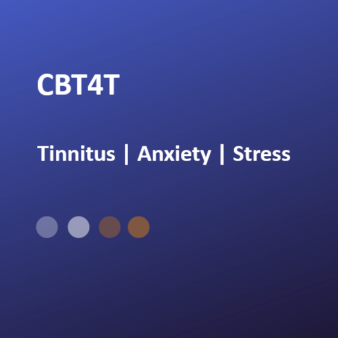Laura, UK
Review written at Stage 6 (of 12) 21 weeks after enrolment
Tinnitus Functional Index (TFI) 56.8% > 22.4% (category 4: 54-72% big problem > category 3: 32-53% moderate problem > category 2: 22.4% small problem by Module 9)
Last review/feedback received at Stage 6
Q: Do you recommend others to use the CBT for Tinnitus E-Programme?
A: "There is no cure for tinnitus, so the only option is to learn to live with it. This course teaches you the tools to be able to do that, with expert support from Debbie. You have to commit to it, using the breathing and relaxation exercises everyday as well as the cognitive work, but it's well worth the effort. I have already felt the benefit and I'm only halfway through the course."
Q: What benefit have you experienced using the relaxation element of the course so far?
A: "I was already doing a short relaxation exercise each evening and was familiar with focusing on the breath through doing tai chi. However, doing the breathing and relaxation exercises on a regular basis throughout the day has certainly helped to calm me down and reduce my anxiety levels."
Q: How has the neuroscience-based learning about the amygdala, autonomic ladder and brain plasticity helped you to relate to your experience of tinnitus, anxiety and stress?
A: "It has been interesting to learn about what is happening from a neuroscience perspective. It has helped to make sense of how I have been feeling and reacting to the tinnitus and what I need to do to achieve change."
Q: What have you learned from the costs & benefits transaction work (used from stage 3)? Estimate how much you have already adjusted from having a problem-oriented perspective towards a recovery-oriented perspective (e.g. 2/10 > 7/10 indicates an improvement of 5 so far)
A: "From doing the Costs & Benefits Transaction work and the Meaning Adjuster, I have realised how much I had been filtering out the positive and catastrophising and how unhelpful this has been. Through regular practice, I am trying to change to a more recovery-orientated perspective. Some days it is easier to do this than others, but overall, I am feeling less distressed and more like 'me'. There is more work to do, but I would estimate that I have seen an improvement of 2/10 > 6/10."
Q: You are likely to have had your first 1-1 by now. Did you benefit from your 1-1 and if so, how?
A: "It was reassuring to talk to Debbie, who understood what I had been experiencing. It was encouraging to be told that I was doing okay."
Q: What is your own impression of your progress to date?
A: "There is no doubt that I have made progress (as I keep reminding myself!). My mid-term measures prove this. I have largely lost the sense of fear that I had and am starting to feel more like 'me' and enjoy life more again. I am sleeping better. There are still good days and difficult days, but even on difficult days when the tinnitus does seem intrusive or after an unexpected loud noise event, I am not getting as distressed as I used to and there are parts of each day when I forget about it. Obviously, I still wish i didn't have this tinnitus, but I feel I am on the road to being able to accept it as an unimportant part of being me. There's more work to do to achieve that, though."
